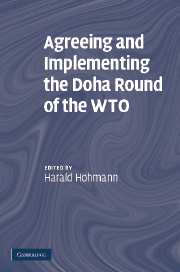Book contents
- Frontmatter
- Contents
- List of Contributors
- Foreword
- Introduction
- The future of the Doha Round
- PART ONE Development policy of the WTO
- 2 Developmental aspects of the Doha Round of negotiations
- 3a Aspects of development policy in the Doha Round – An EC perspective
- 3b An assessment of the Sixth WTO Hong Kong Ministerial Conference from a development perspective
- 4 Capacity building and combating poverty in the WTO
- 5 Integrating development and SDT (Special and Differential Treatment) into the architecture of the WTO – through the operation of its Dispute Settlement System
- PART TWO Trade policy (including competition) and trade facilitation
- PART THREE Reform of the dispute settlement system
- PART FOUR Social rights, health, and environment
- PART FIVE Conclusions
- Index
4 - Capacity building and combating poverty in the WTO
from PART ONE - Development policy of the WTO
Published online by Cambridge University Press: 23 February 2010
- Frontmatter
- Contents
- List of Contributors
- Foreword
- Introduction
- The future of the Doha Round
- PART ONE Development policy of the WTO
- 2 Developmental aspects of the Doha Round of negotiations
- 3a Aspects of development policy in the Doha Round – An EC perspective
- 3b An assessment of the Sixth WTO Hong Kong Ministerial Conference from a development perspective
- 4 Capacity building and combating poverty in the WTO
- 5 Integrating development and SDT (Special and Differential Treatment) into the architecture of the WTO – through the operation of its Dispute Settlement System
- PART TWO Trade policy (including competition) and trade facilitation
- PART THREE Reform of the dispute settlement system
- PART FOUR Social rights, health, and environment
- PART FIVE Conclusions
- Index
Summary
Trade liberalization, the main objective of multilateral trade negotiations, is expected to result in economic growth. Faster economic growth can lead to poverty reduction, if not eradication. Today, all over the world, 1.3 billion people live on less than one dollar a day, one-half of the world, or nearly three billion people, live on less than two dollars a day. Approximately 790 million people in the developing world are still chronically undernourished, almost two-thirds of whom reside in Asia and the Pacific. More heart-wrenching is the UNICEF report which states that 30,000 children die daily because of extreme poverty – “and they die quietly in some of the poorest villages on earth, far removed from the scrutiny and the conscience of the world. Being meek and weak in life makes the dying multitudes even more invisible in death.” In 2003, 10.6 million died before they had reached five years of age, the same children population in France, Germany, Greece and Italy.
Faced with the existing poverty in developing countries, hope is high that the Doha Round of multilateral trade negotiations, which is supposed to be a development Round, will be true to its name. The Doha declaration clearly states that: “International trade can play a major role in the promotion of economic development and alleviation of poverty … In this context, enhanced market access, balanced rules, sustainably financed technical assistance and capacity building programmes have important roles to play.”
- Type
- Chapter
- Information
- Agreeing and Implementing the Doha Round of the WTO , pp. 111 - 132Publisher: Cambridge University PressPrint publication year: 2008



